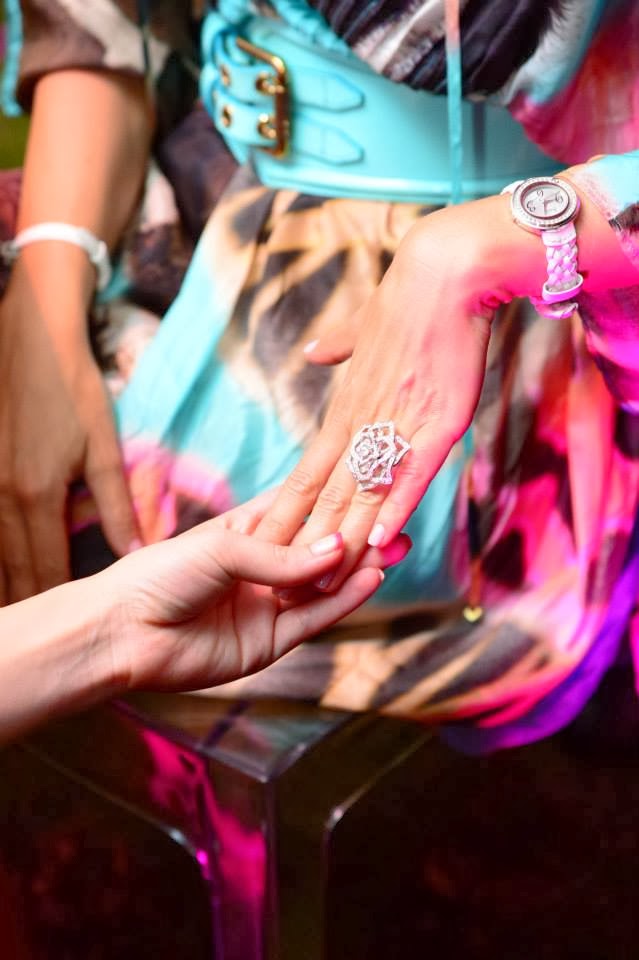In 2012 for the occasion of the 30th birthday of the Yves Piaget Rose which was named in 1982, the House of Piaget presented the Piaget Rose high-jewellery collection.
"For Piaget, the rose is the symbol of a passion - that of Yves Piaget, and that of the designers and jeweller craftsmen it inspires. Through their talent, some 100 creations have bloomed in Piaget's rose garden.
The rose is a talisman, a message of eternity and renewed love that pulsates daily. A generous, joyous icon mirroring the rose of which it is the muse: the Yves Piaget Rose."
During my last stay in September for the Paris Fashion Week, I had the great pleasure to visit the PIAGET Boutique 16, Place Vendôme in Paris, to get some more wonderful insights of the Piaget's high-jewellery collections and an interview with Alexandra Dubois, responsable for Presse, PR & Digital of PIAGET. I discovered the new Limelight Gala watch collection composed of six different types of watches which was presented for the 1st time in January 2013 at the SIHH Salon International de la Horlogerie in Geneva, and available only since September 2013 in Piaget-stores worldwide.
Limelight Gala - 38mm 18K gold watch.
Case set with 62 brilliant-cut diamonds (approx. 2.8 cts).
Dial paved with 336 brilliant-cut diamonds (approx. 1.7 cts),
pink gold indexes. With satin strap with ardillon buckle set with
15 brilliant-cut diamonds (approx. 0.1 cts).
Piaget 690P quartz movement
Château de Malmaison - Piaget As A Patron Of Arts
The House of Piaget became the patron of the project to restore the "former" Joséphine de Beauharnais's rose garden, Château de Malmaison, Swiss watchmaker and jeweller Piaget is contributing to bringing one of the most beautiful testimonials to the love of roses back to life. The rose has a history that Piaget is committed to preserving. By becoming a patron of the project. The re-inauguration of this wonderful rose garden will be presented with an wonderful event the upcoming March 2014, organized by the House of Piaget, and accompanied with the presentation of two new large high-jewellery collections by Piaget.
Piaget is making a contribution to the restoration of the castle’s former rose garden to its original splendour by sponsoring the renovation project spearheaded by the Musée National de Malmaison, in preparation for the bicentennial of the death of the Empress in 2014. The woman whom Napoleon renamed Joséphine had, from birth, a predilection for roses thanks to her given name, Rose. The collection that she brought together at Malmaison became, just like the Piaget Rose jewellery collection, one of the most beautiful and enviable collections in all of Europe, thanks to the diversity of some 250 varieties it contained in 1814. The Malmaison Museum will bring this collection to life again, and at the end of the reconstruction, it will present 750 rose bushes from the First to the Second Empire, enhancing our knowledge of the botanical work of the Empress.
Some historical backgrounds ...
The Empress Joséphine, a woman above all others incarnates the passion for roses. For her refined taste, and as leader of fashion, roses are an essential presence. In her gardens, her salons, even on her clothing and in her hair, which she adorned with fresh flowers, roses were part of her daily life. But Joséphine’s interest went beyond coquettish fashion. She was a woman ahead of her time, a woman who had an inexhaustible curiosity and a desire to preserve and to share. She hired botanists and sent them out over the world in quest of species of roses that did not exist on the continent.
She gave Redouté, the water colour painter, a mandate to catalogue very precisely the varieties that she gathered together in the palace gardens. The rose garden she assembled is a veritable conservatory of roses. The works of Redouté, along with this exceptional garden itself, have lent an essential contribution to our knowledge of roses.
Château de Malmaison which is located some fifteen kilometres from Paris was acquired by Napoleon and Joséphine Bonaparte in 1799. The future empress was to give this domain the special character that still accounts for its charm today. From 1800 to 1802, under the Consulate, this little palace became, along with the Tuileries, the seat of the government of France.
Joséphine never tired in her efforts to make the "Imperial Palace of Malmaison" and especially its park, a place of wonder. To the very great variety of plants in her garden, she unstintingly added the company of exotic animals: black swans, ostriches, zebras, and antelopes. The Emperor divorced the Empress for reasons of state in 1809 and gave her the domain of Malmaison, which remained Joséphine’s favourite residence until her death in 1814.
The Château de Malmaison then passed into private hands, and was gifted to the French State by a generous donor in 1904. Today it belongs to the Musées Nationaux Français.
Last June 13, during the inauguration of the 1st Piaget Rose Day which will become an annual event in Piaget-stores worldwide, Piaget Boutique Place Vendôme welcomed 50 brand enthusiasts for a unique experience in collaboration with the famous French website MyLittleParis. With a staff to cater to their needs, access to try on their favorite Piaget jewelry, polaroids and rosé champagne, the lucky guests spent a memorable day in honor of the Yves Piaget rose.
Please, take some beautiful insights on the Piaget Rose Collection ...! LoL, Andrea

Selections by ANDREA JANKE Finest Accessories
Photos: Courtesy of The House of Piaget & ANDREA JANKE
More PIAGET To Love ...
'The new Limelight Gala Watch collection which was presented for the first time in January 2013 at the SIHH Salon International de la Horlogerie in Geneva and in stores since September, draws a wealth of inspiration from this fascinating period and establishes itself as the new Piaget icon.'
Tweet


































No comments:
Post a Comment